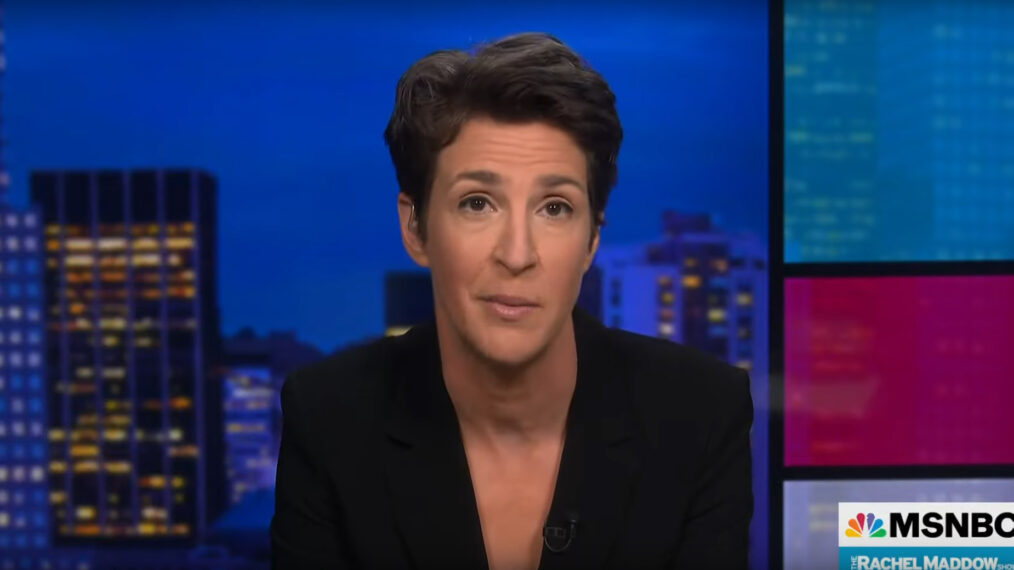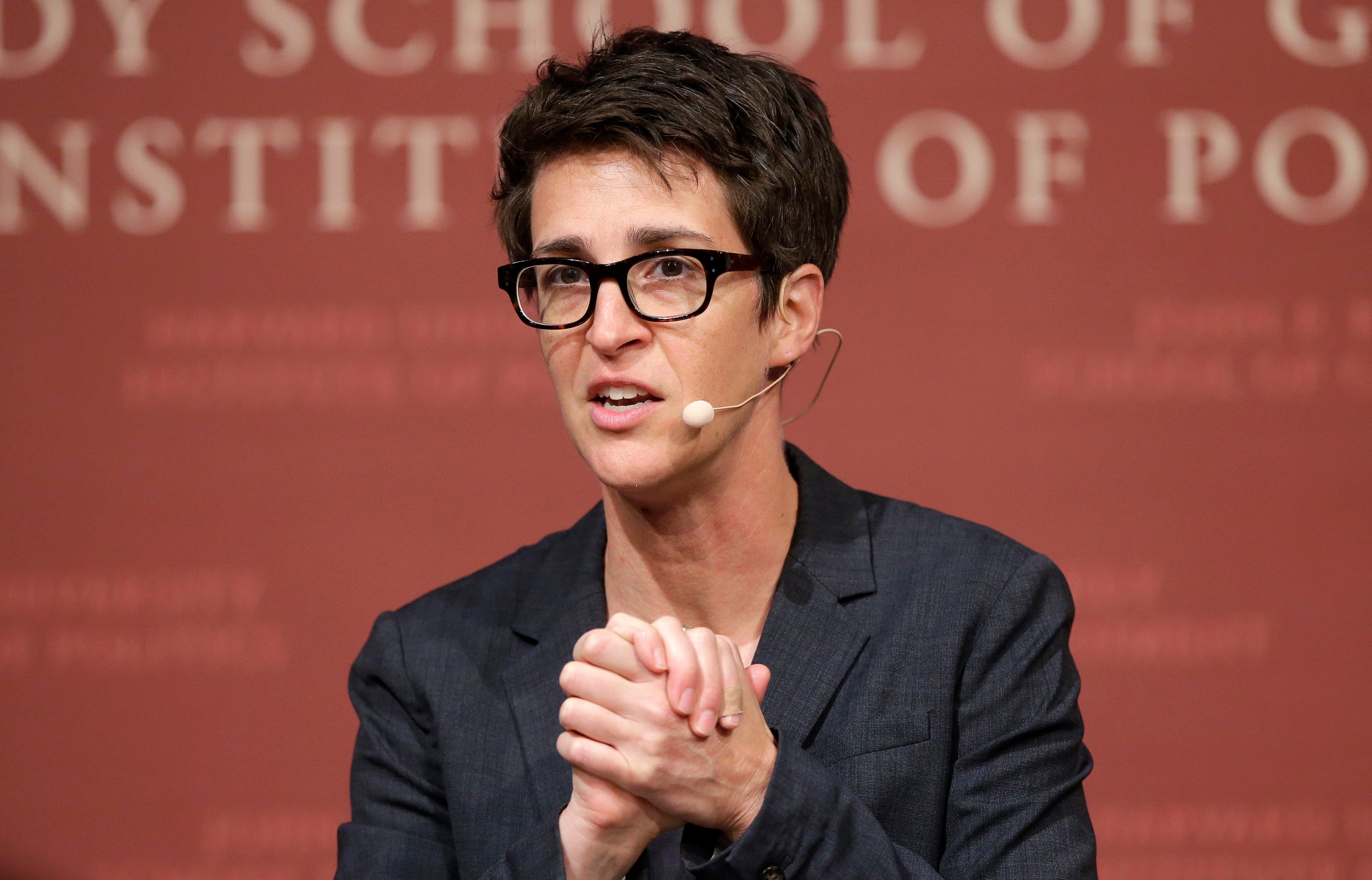Many people, you know, find themselves asking about the changing landscape of television news, and very often, a big question pops up: Why is Rachel Maddow only on once a week? It's a query that, in a way, echoes a broader human curiosity about reasons and purposes, a bit like how we wonder about the origins of words or the logic behind certain phrases. Just as the word "why" itself has a long history, as my text points out, stretching back to old forms used to ask for a reason, so too do we seek the underlying causes for shifts in public life, including those involving prominent figures like Rachel Maddow. Her move from a nightly presence to a weekly slot on MSNBC certainly sparked a lot of discussion, and it’s something many viewers are still trying to figure out.
It's a really interesting point to consider, how a familiar face on our screens suddenly changes their routine. For a long time, Rachel Maddow was a constant, a voice that viewers could count on every weeknight. Then, quite suddenly, her schedule shifted, and she began appearing just once a week. This sort of change can, naturally, make people wonder what's going on behind the scenes, and it really gets people talking about the reasons for such a significant adjustment.
The decision for Rachel Maddow to scale back her regular appearances was, as a matter of fact, a big topic in media circles. It wasn't a secret, but the specific reasons might not be clear to everyone who simply tunes in. People often ask, you know, why things are the way they are, and this situation with a well-known news personality is no different. We want to understand the motivations, the agreements, and the future plans that lead to such a noticeable alteration in a very public role.
Table of Contents
- Who Is Rachel Maddow?
- The Shift in Her Schedule: Exploring the "Why"
- Frequently Asked Questions About Rachel Maddow's Schedule
- What This Means for Viewers and the Future
Who Is Rachel Maddow?
Rachel Maddow is, you know, a very prominent figure in American television news. She's known for her deep dives into political topics and her detailed explanations of current events. Before becoming a household name on cable news, she had a background in radio and earned a doctorate in political science. Her approach to journalism often involves a thorough examination of facts and historical context, which has, you know, gained her a very loyal following over the years.
Her program, "The Rachel Maddow Show," became a flagship program for MSNBC, especially during significant political periods. She built a reputation for delivering news with a particular perspective, often breaking down complex stories into understandable parts. This commitment to detailed reporting is, in some respects, a hallmark of her work, and it's what many viewers have come to expect from her.
Here are some basic details about her career and personal life, just so you have a bit of context:
| Detail | Information |
|---|---|
| Full Name | Rachel Anne Maddow |
| Born | April 1, 1973 |
| Birthplace | Castro Valley, California, USA |
| Education | Stanford University (B.A.), University of Oxford (D.Phil.) |
| Occupation | Television Host, Political Commentator, Author |
| Known For | Host of "The Rachel Maddow Show" on MSNBC |
| Years Active | Early 1990s – Present |
The Shift in Her Schedule: Exploring the "Why"
The question of why Rachel Maddow's presence on MSNBC changed from nightly to weekly is, you know, something many people have pondered. It's a bit like asking why certain words adapt their meaning over time, as my text mentions with "pineapple" or "spook." There are often deeper reasons, or at least a chain of events, that lead to such a visible change. In her case, the reasons are actually quite well-documented and involve a combination of personal desires, professional goals, and network strategy.
A New Contract and Fresh Opportunities
The primary reason for her reduced on-air schedule stems from a new contract she signed with NBCUniversal in 2021. This agreement, which was a very significant one, allowed her to step back from the daily grind of a prime-time show. It was, in a way, a strategic move for her career, giving her the chance to pursue other creative endeavors and projects beyond the nightly news desk. She wanted to work on things like podcasts, documentaries, and other special programming, which a daily show schedule simply doesn't permit.
This kind of arrangement is, you know, not entirely unheard of in the media world, especially for very high-profile personalities. When someone has built up a strong brand and a loyal audience, networks often work to retain them, even if it means adjusting their traditional roles. The idea is to keep their talent and influence within the family, so to speak, while also giving the talent the flexibility they desire. So, it's almost a win-win situation for both sides, allowing her to expand her work while still being a part of MSNBC.
The Demands of Daily Television
Hosting a nightly prime-time news program is, to be honest, an incredibly demanding job. It requires constant attention to current events, extensive research, and a very intense production schedule, five days a week. This kind of work can be, you know, quite draining over many years. Rachel Maddow had been doing this for a considerable period, and it's natural for anyone in such a role to seek a different pace or new challenges. The relentless nature of daily news means that every day brings a new set of stories, new facts to check, and new analyses to prepare, which can, quite frankly, take a lot out of a person.
Stepping back to a weekly show allows her to have more time for in-depth reporting and special projects that might not fit into a fast-paced daily format. It provides an opportunity to explore subjects with more depth and less immediate pressure, which can lead to different kinds of content. This shift, therefore, is also about managing her energy and allowing for a more sustainable pace of work, which is something many professionals seek after years in a very high-pressure environment.
Strategic Moves for MSNBC
For MSNBC, retaining Rachel Maddow's talent and influence was, you know, a very important goal. Even if it meant a reduced presence on the nightly schedule, keeping her connected to the network was a strategic move. Her brand recognition and credibility are, basically, very valuable assets. By allowing her to pursue other projects under the NBCUniversal umbrella, the network ensures that her expertise and unique voice remain available for special coverage and other ventures, which is quite clever, really.
This arrangement also allows MSNBC to experiment with its prime-time lineup. While Rachel Maddow's show was a ratings success, having a more flexible schedule for her creates space for other hosts and programs to develop. It's a way for the network to evolve and adapt to changing viewer habits and preferences, perhaps aiming for a broader appeal. So, in a way, it's a strategic adjustment that benefits both the talent and the broadcasting company, which is pretty common in the media business.
Frequently Asked Questions About Rachel Maddow's Schedule
People often have a lot of questions about this change, and it's understandable why. Here are some common inquiries, you know, the kind of things people often ask when they're trying to figure out the "why" behind a public figure's career path.
Is Rachel Maddow leaving MSNBC completely?
No, she is not leaving MSNBC completely. Her new contract keeps her with the network, but with a different role. She now hosts "The Rachel Maddow Show" on Monday nights. This arrangement allows her to remain a key part of MSNBC's lineup while also dedicating time to other projects, which is, in fact, a very deliberate choice on her part. She's still very much a part of the team, just in a different capacity.
What new projects is Rachel Maddow working on?
Rachel Maddow is, you know, working on a range of new projects as part of her expanded role. These include developing new shows and specials for NBCUniversal, such as documentaries and podcasts. For example, she's been involved with the "Ultra" podcast, which explores historical events with her signature deep-dive style. This allows her to tell stories in different formats, which she seems to enjoy very much.
Who replaced Rachel Maddow in her nightly slot?
After Rachel Maddow shifted to her weekly schedule, MSNBC introduced a rotation of hosts to fill the prime-time slot on Tuesday through Friday nights. This approach allowed the network to showcase different talents and perspectives. Eventually, Alex Wagner was named the permanent host for the Tuesday through Friday 9 PM ET hour, continuing the network's commitment to in-depth news coverage. So, it was a gradual shift, you know, to find the right fit for that very important time slot.
What This Means for Viewers and the Future
For viewers, Rachel Maddow's shift means a different way of engaging with her content. Instead of a nightly presence, her weekly show becomes, you know, a more focused event, perhaps offering a deeper look at one or two major topics. It encourages viewers to seek out her other projects, like her podcasts or special reports, which are now a bigger part of her work. This change, in a way, reflects how media consumption is evolving, with people getting their information from various sources and formats.
The media landscape is, you know, constantly changing, and this kind of move by a prominent personality is, in some respects, a sign of those shifts. It shows that even established figures are adapting their roles to new opportunities and demands. As for the future, we can probably expect to see more of these kinds of flexible arrangements for top talent in the news business. It's a way to keep very valuable voices engaged while also exploring new ways to deliver content to audiences. Learn more about media trends on our site, and you can also find out more about major news personalities and their career paths.
This evolution also brings up the broader question of "why" we consume news the way we do, a bit like the deeper meanings behind words my text explores. Why do we prefer certain formats? Why do we gravitate towards particular voices? Rachel Maddow's adjusted schedule is, you know, a part of that ongoing conversation about how news is made and shared. It's a testament to her enduring appeal that people are still asking about her schedule, showing a real interest in her work and what she chooses to focus on. For more details on her career and impact, you might look at articles from reputable news organizations like The New York Times, which has, you know, covered her career for a long time.
Related Resources:



Detail Author:
- Name : Pearl Steuber
- Username : udickinson
- Email : zstiedemann@yahoo.com
- Birthdate : 1970-04-18
- Address : 381 Ryan Well Apt. 203 Bernierhaven, WI 87182-4311
- Phone : 1-920-835-5832
- Company : Langworth-McLaughlin
- Job : Bindery Machine Operator
- Bio : Omnis nobis veritatis reprehenderit suscipit. Quia sit itaque impedit sit et. Alias officiis dolores quae sint corporis. Nisi ea et ut ut dolorem.
Socials
instagram:
- url : https://instagram.com/jenkinsr
- username : jenkinsr
- bio : Dignissimos omnis optio et aut aperiam debitis et. Voluptas facilis aut quod perferendis eius.
- followers : 995
- following : 599
facebook:
- url : https://facebook.com/jenkinsr
- username : jenkinsr
- bio : Omnis occaecati ipsam impedit aut pariatur ad.
- followers : 4036
- following : 1788